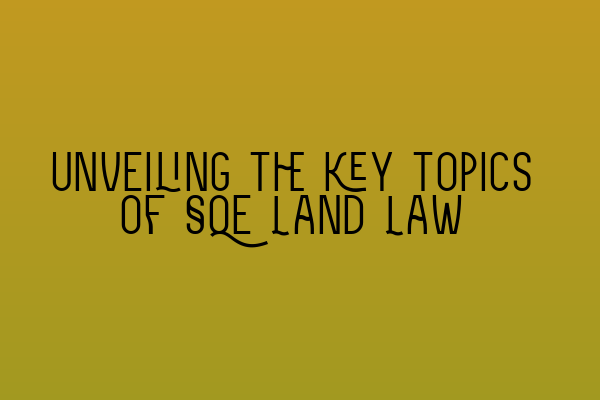Unveiling the Key Topics of SQE Land Law
Welcome to SQE Property Law & Land Law! In this blog post, we will dive deep into the key topics of SQE Land Law, providing you with a comprehensive overview of what you can expect in this area of study. Whether you are a budding solicitor or an experienced professional looking to brush up on your knowledge, this guide is designed to help you stay ahead of the game.
Before we get started, make sure to check out our recommended resources for SQE exam preparation: SQE 1 Practice Exam Questions and SQE 1 Practice Mocks FLK1 FLK2. These resources will provide you with invaluable practice and help you assess your understanding of key concepts.
Now, let’s delve into the key topics of SQE Land Law:
1. Freehold and Leasehold Estates:
– Understanding the differences between freehold and leasehold estates is fundamental in land law. This topic explores the rights and obligations of both types of estates, as well as the conveyancing process for each.
2. Co-ownership and Trusts:
– Co-ownership of property and the establishment of trusts are commonly encountered in land law cases. This section covers the basics of joint tenancy, tenancy in common, and the creation and effects of trusts, including resulting and constructive trusts.
3. Registered and Unregistered Land:
– Land in England and Wales can be either registered or unregistered. This topic explores the registration process, the benefits of registration, and how to deal with unregistered land.
4. Easements and Covenants:
– Easements, rights of way, and covenants are essential aspects of land law. This section will provide an in-depth analysis of the creation, types, and enforcement of easements and covenants.
5. Mortgages and Charges:
– Mortgages and charges are crucial elements of property financing. This topic delves into the legal framework surrounding mortgages and charges, including the duties and rights of both borrowers and lenders.
6. Leases and Licenses:
– Leases and licenses determine the occupation and use of land. This section covers the essential elements of leases, including their creation, terms, and termination. Additionally, it explores the difference between leases and licenses.
7. Adverse Possession:
– Adverse possession allows a person to acquire ownership of land through continuous and exclusive possession. This topic examines the requirements, duration, and limitations of adverse possession claims.
These are just a few of the key topics that you will encounter in SQE Land Law. Each area requires a comprehensive understanding of the applicable legal principles, case law, and statutory provisions. It is essential to invest time and effort into studying and preparing for the SQE exams.
To enhance your exam preparation, we highly recommend exploring our SQE 2 Preparation Courses and SQE 1 Preparation Courses. These courses are designed to provide you with comprehensive guidance, practical examples, and expert insights, ensuring you are fully prepared come exam day.
Don’t forget to mark your calendars with the upcoming SRA SQE Exam Dates. Planning your study schedule and allocating sufficient time for revision is crucial for success in the SQE exams.
In conclusion, mastering the key topics of SQE Land Law is essential for anyone pursuing a career in property law. Whether you are a student or a professional, a solid understanding of these topics will not only help you excel in exams but also in your future legal practice.
So, get ready to dive into the world of SQE Land Law, and remember, SQE Property Law & Land Law is here to guide you every step of the way.
